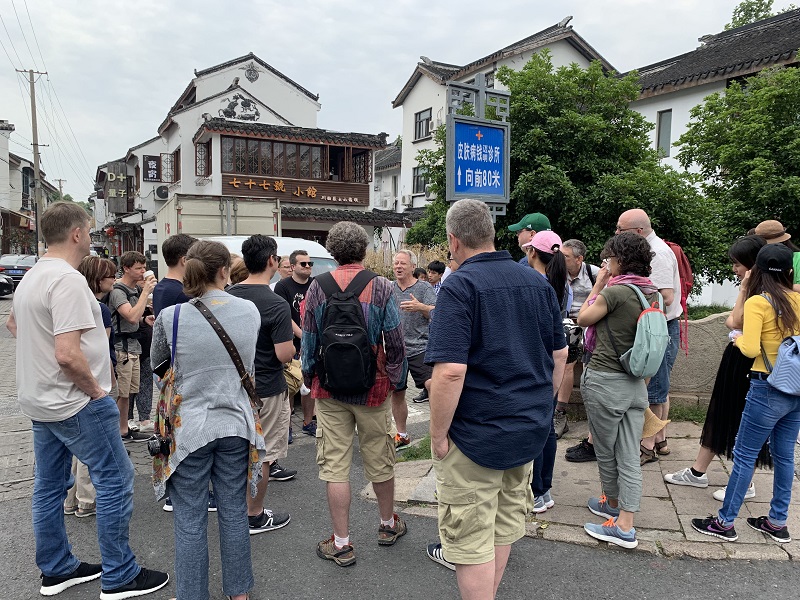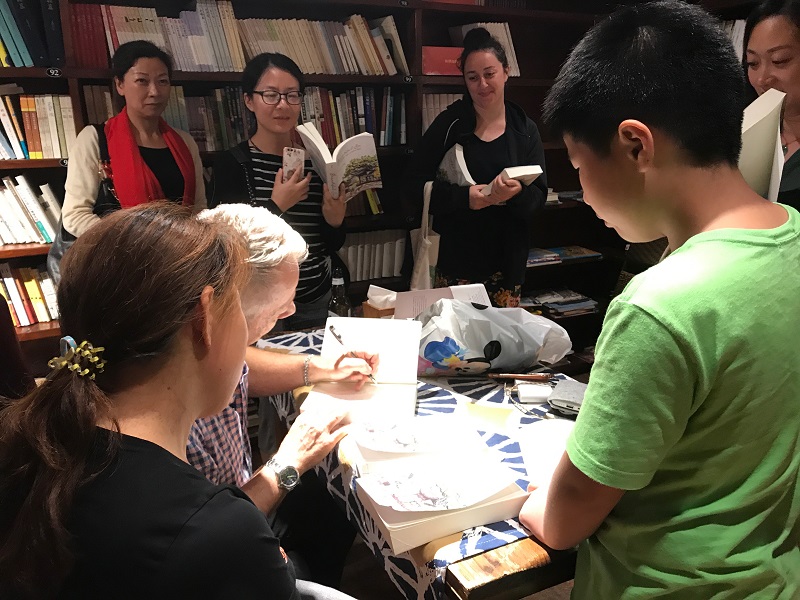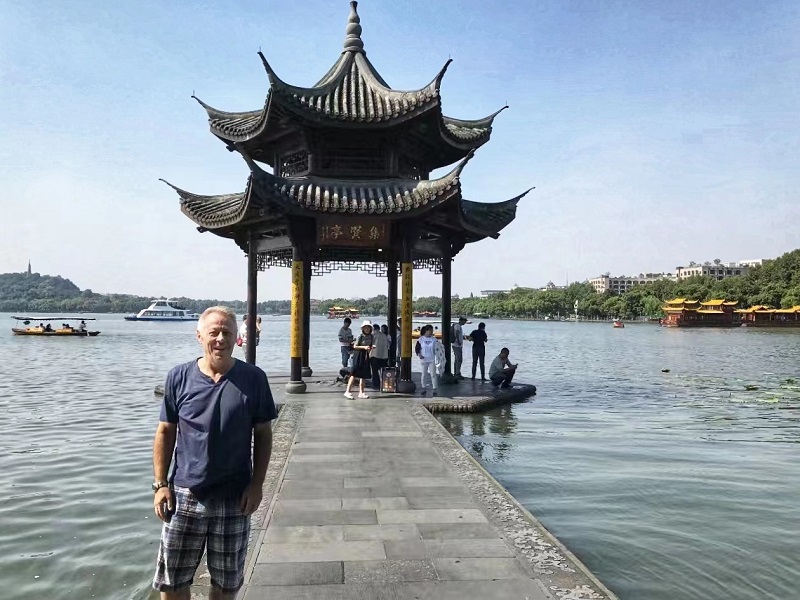A group of people standing by the Grand Canal in Suzhou City in east China’s Jiangsu Province look fascinated as they watch the barges go past on the longest canal in the world, a UNESCO World Heritage Site. But to the people watching the group, their guide, a foreigner telling them the story of the pirates of the Grand Canal in the 1500s, is even more fascinating.

Stephen L. Koss (center) is leading the “Walking with Steve” tour at Shiquan Jie, a famous street for shopping and nightlife in Suzhou, on June 2, 2019.
New Yorker Stephen L. Koss conducts city walk tours, known as “Walking with Steve,” guiding visitors through little-known but culturally rich places in Suzhou based on the experience garnered from his long acquaintance with the city, known as the city of gardens (Suzhou is best known for its gardens, and Hangzhou known as a silk hub). Many locals admit they are surprised and even “embarrassed” because Stephen knows Suzhou better than they do.
Write Something about Suzhou
Wind back to 1993 and Stephen was a math teacher in a New York high school near Manhattan’s Chinatown. About a fourth of the students were Chinese and he became friends with them. One day, some of them asked him if he would like to be the advisor of their Asian Culture Club since according to the school’s rules, a new club must have a teacher taking responsibility for it. Stephen said yes, and that yes changed his life.
He became interested in Chinese history and culture and began to listen to Chinese songs, watch Chinese movies, and read Chinese books. The students noticed this and persuaded him to visit China. Finally, in the summer of 2001, Stephen Koss arrived in China.
He visited all the prime tourist destinations along with 11 other Americans: Beijing, Shanghai, Xi’an, and the other big cities. But Suzhou gave him a unique impression. In Suzhou, people talked to him when he walked in the streets, introducing themselves and explaining they would like to practice English with him, and Stephen is game. He recalled that experience: “They were very open to foreigners, which I didn’t really experience in the other places in China, or not as much. It sort of intrigued me.” Suzhou cast such a strong spell that he returned the following summer when he met Ping, a native of Suzhou. They fell in love and got married one year later.
Stephen and Ping traveled between China and America, spending the summers in Suzhou, which opened a new world for Stephen. He visited historical sites, guest-taught at a local high school, and watched the local opera. He went beyond Suzhou, exploring the countryside on his bike and visiting the water towns in the region, ancient towns known for their rivers, bridges and canals. Eventually, the couple decided to stay in Suzhou for half of the year and in New York the other half. This experience enriched Stephen’s understanding of Suzhou and its culture and he became a vitual Suzhouren, a Suzhou local.
Whenever he returned to the U.S., people would ask him where he lived in China. When he said “Suzhou,” the usual response would be, “Where’s that?” So, he would have to explain, saying it’s a city about 80 km from Shanghai. “The more I learned about Suzhou, the more surprised I was at how little it was known in the West,” Stephen said.
In 2006, Stephen tried to find English books about Suzhou. He went to libraries and searched the Internet but found only academic journals that focused on specific aspects of Suzhou and were not reader-friendly. Stephen thought, “Maybe I can write something.”
He began researching in libraries like the New York Public Library and when in Suzhou, would add new materials. The research took him about six years and after two years more of writing and revising, his book Beautiful Su: A Social and Cultural History of Suzhou, China, was published in 2015.
Stephen and Ping took the book to Suzhou Daily, a local newspaper, which immediately interviewed him, doing a front-page article in Suzhou Review, its English page. Soon, he became the talk of the town and other local media outlets lined up to interview him. People were surprised that an expat knew so much about Suzhou. Stephen also promoted his book in the U.S., taking copies to several universities like Columbia University and interacting face-to-face with readers to introduce Suzhou to them. The feedback was very positive and many said they want to visit Suzhou.

Stephen L. Koss is signing the book Beautiful Su: A Social and Cultural History of Suzhou, China for readers at the Suzhou Bookworm store on June 10, 2017.
One day in the Spring of 2017, the editor of Suzhou Review suggested that Stephen could do city walks of Suzhou since he knew the city so well. So in the summer of 2017, “Walking with Steve” was launched. Over the next three years, it developed into almost 20 different routes based on Stephen’s experiences. About 30 people signed up for the first walk. He took them to both well-known and little-known places, including gardens and pagodas and sites related to the history, culture, nature and food of Suzhou. Each summer, both locals and expats join the tours and become Stephen’s friends.
Explain Hangzhou, a Window to History
In 2015 after Beautiful Su was published, the publisher asked Stephen if he was interested in writing a book about Hangzhou, the provincial capital of Zhejiang, as both Suzhou and Hangzhou are historically regarded very highly. In fact, an old Chinese saying goes, “In the sky there is Heaven; on Earth are Suzhou and Hangzhou.” Stephen thought a book on Hangzhou would be an excellent chance to tell people more about Chinese history and culture so that they can realize there is more to China than just Beijing, Shanghai and Hong Kong.
When he started his research and tried to find English books about Hangzhou, he found himself in the same predicament as with Suzhou. “A lot of people have done a lot of research. But that’s mostly academic and very specific to a particular topic. They’re also not written for people who just want a casual read.”
Stephen, who had visited Hangzhou several times, went there multiple times again in order to write the book. “Hangzhou is incredibly clean. (It) is really about the West Lake, and so many interesting things are nearby the Lake. But not everything!” Indeed, the West Lake, the beautiful freshwater lake at the center of the city, is synonymous with it, just like the Seine River is with Paris.

Stephen L. Koss visiting the West Lake in Hangzhou on September 18, 2017.
His book on Hangzhou, By the Hills Embraced, was finally published this year after six years of research and visits as well as two more years of writing and polishing. The title is inspired by a poem praising Hangzhou by Bai Juyi, a famous poet from the Tang Dynasty (618-907).
The book records the history and culture of Hangzhou and its satellite cities from ancient to modern times. Neither a personal experience nor a travel guide, it also includes, according to Stephen, “the stories of individual persons – some renowned, others perhaps little known – each of whom contributed in some way to significant events or the development and evolution of local culture and whose work and lives, whether remembered, little known or forgotten, are celebrated by the millions of Chinese people who visit Hangzhou and the West Lake every year.”
Stephen also likes to include surprising details. For instance, the West Lake, though a famous tourist site, was largely walled off by the Manchu Garrison during the Qing Dynasty (1644-1911) and was therefore not readily accessible to the public. After 1911, when the wall was torn down, the lake had silted and was not very deep. Hangzhou people nevertheless declared happily that “West Lake has entered the city!” The lake was dramatically deepened and beautified by as many as 30 million new tree plantings after the founding of the People’s Republic of China in 1949. Even many locals do not know such details.
Stephen and Ping, who were away in New York due to the pandemic and ensuing curbs on traveling, plan to return to Suzhou after five years. He can’t wait to explore the changes in Suzhou and restart his walking tours. Moreover, he is working on a new book based on the notes of his pre-pandemic city walks, giving his readers yet another surprise.
It’s hard for a foreigner to write about a foreign city in such exquisite detail but Stephen did it. As Hangzhou hosts the 19th Asian Games from September 23 to October 8, books like By the Hills Embraced would help foreigners understand the city. This is the very definition of cultural exchange.